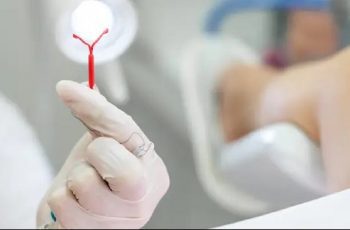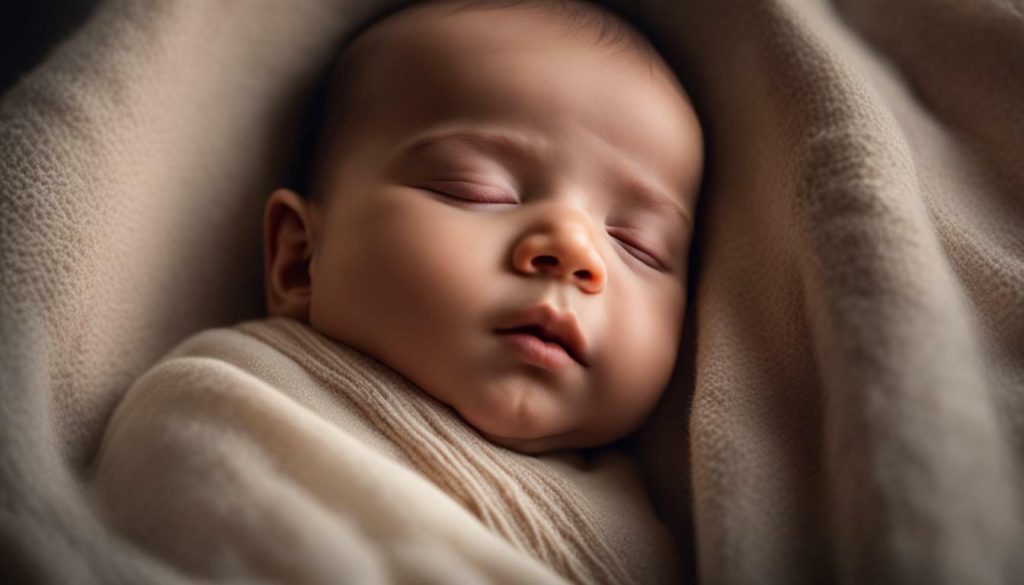
- Babies smile in their sleep for various reasons, including reflexes, cognitive development, and emotional experiences.
- Smiling during sleep is often an involuntary reflex, and babies may also smile in response to passing gas or stool.
- Smiling in sleep typically occurs during the rapid eye movement (REM) sleep phase, where babies may experience vivid dreams and physiological changes that trigger reflexes.
- A baby’s smile in sleep is assumed to be similar to why they smile when awake, such as reflexes, reactions to people or things, or sensory responses to taste or smell.
- Excessive or prolonged smiling during sleep or other unusual symptoms may warrant medical attention.
Now, let’s explore the fascinating world of why babies smile in their sleep and uncover the secrets behind those adorable, dream-filled smiles that grace their faces.
The Fascinating Phenomenon of Smiling in Sleep
Smiling in sleep is a common behavior among babies, but what causes those adorable smiles to appear? It’s a question that has intrigued parents and researchers alike. As babies peacefully slumber, their tiny lips curl upwards, bringing joy to anyone who witnesses this heartwarming sight. In this section, we’ll explore the reasons behind these precious smiles and shed light on the fascinating phenomenon of smiling in sleep.
One possible explanation for babies’ smiles in sleep is related to reflexes. Babies have an abundance of reflexes, and some of these reflexes may be triggered during sleep, resulting in a smile. For example, a baby may smile in response to passing gas or stool, which is a normal bodily function. These reflexive smiles add an extra touch of cuteness to their sleepy visage.
Another factor that contributes to smiling in sleep is the rapid eye movement (REM) sleep phase. During REM sleep, babies experience vivid dreams, accompanied by physiological changes such as increased brain activity and muscle twitching. These dreams and physiological changes can elicit reflexes, including smiling. It’s as if they are relishing the joys of their dreams, expressing their happiness with a smile.

While the exact reason for a baby’s smile in sleep remains a mystery, it is believed to be similar to why they smile when awake. Babies may smile in response to reflexes or reactions to people or things in their environment. They may also smile as a sensory response to pleasant tastes or smells. These smiles serve as a way for babies to communicate their happiness and contentment, even while they are in the midst of their slumber.
It’s important for parents to note that excessive or prolonged smiling during sleep, along with other unusual symptoms, may warrant medical attention. Monitoring your baby’s sleep patterns and behaviors is crucial for their well-being. To encourage your little one to smile, try engaging in face-to-face interaction, gentle touch, and play during waking hours. Remember, a baby’s smile in sleep is a normal and healthy part of their development, adding an extra sprinkle of joy to their journey towards growth and discovery.
Reflexes and Smiling in Sleep
Reflexes play a significant role in a baby’s sleep behaviors, including their adorable smiles during slumber. These reflexes are involuntary actions that occur without conscious control, and they can be triggered by various stimuli. During sleep, a baby’s reflexes may result in smiles, making their slumber all the more charming.
One common reflex that contributes to a baby’s smiles in sleep is the rooting reflex. This reflex causes babies to turn their heads and open their mouths in response to touch or movement near their face. Even while sleeping, this reflex can be activated, leading to cute smiles as their little mouths react to imaginary stimuli.
Another reflex that can elicit smiles during sleep is the grasping reflex. When a baby’s palm is touched, they naturally respond by curling their fingers around the object. This reflex can manifest during sleep, causing a baby to curl their fingers and potentially even smile as they grasp onto something in their dreams.
| Reflex | Description |
|---|---|
| Rooting Reflex | Causes babies to turn their heads and open their mouths in response to touch or movement near their face. |
| Grasping Reflex | Leads babies to curl their fingers around objects when their palms are touched. |
Quote:
“Babies’ reflexes add an element of sweetness to their sleep, as their smiles reflect the involuntary actions of their developing bodies.” – Dr. Jane Thompson, pediatrician
It’s important to remember that reflexes are a normal part of a baby’s development and should not be a cause for concern. These reflexes often fade as babies grow and their neurological systems mature. However, if you notice any unusual or concerning symptoms accompanying your baby’s smiles in sleep, it’s advisable to consult a healthcare professional for further evaluation.
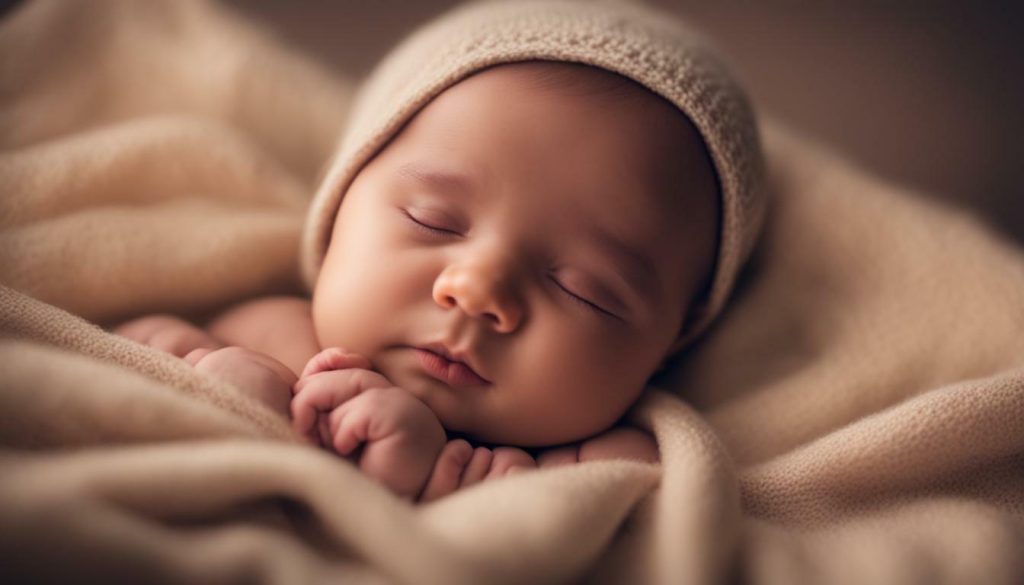
Understanding the connection between reflexes and smiling in sleep can help parents appreciate the natural wonder of their baby’s slumber. These involuntary actions contribute to the joy and innocence that accompanies a baby’s sleep, providing glimpses into their developing bodies and minds.
Next, we’ll explore how cognitive development influences a baby’s smiles in sleep and its significance in their overall growth and well-being.
Cognitive Development and Smiling in Sleep
Cognitive development is a crucial factor in understanding why babies smile in their sleep. As their brains continue to grow and mature, their ability to process information and form connections becomes more sophisticated. During sleep, a baby’s brain undergoes various activities that contribute to their overall cognitive development, including the formation of memories and the processing of emotions.
Research suggests that smiles during sleep may be a result of these cognitive processes. As babies experience dreams and engage with their surroundings in their sleep, their brain activity triggers reflexes that manifest as smiles. These reflexes are often similar to those observed when babies are awake, indicating a link between cognitive development and smiling in sleep.
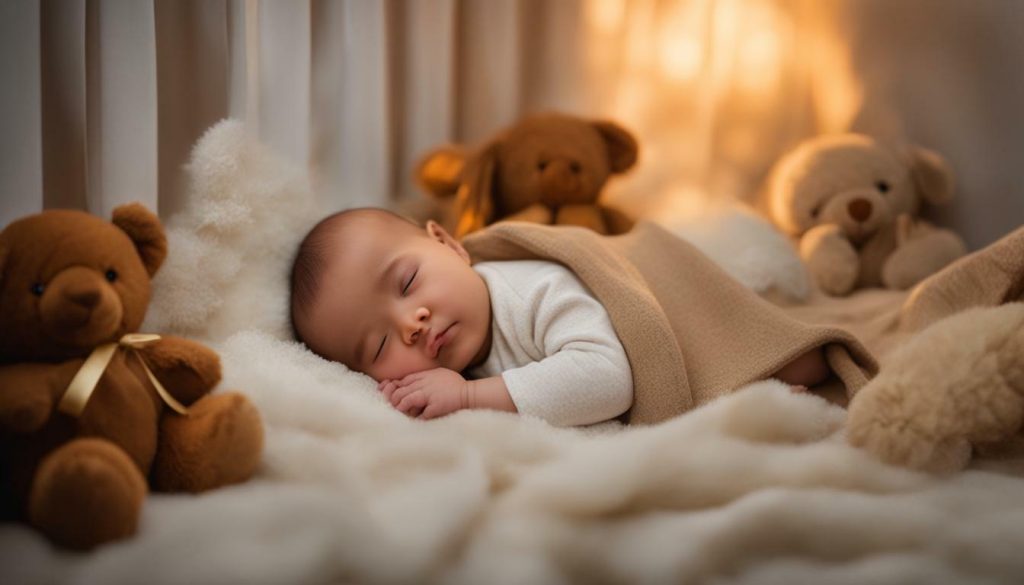
Smiling during sleep is often an involuntary reflex.
While the exact reasons for a baby’s smile in sleep are still not fully understood, it is believed that this behavior is a reflection of their active brain processing and cognitive growth. It is important for parents and caregivers to recognize and appreciate these smiles as a normal and healthy part of their baby’s development.
| Key Points: |
|---|
| Smiling in sleep is linked to a baby’s cognitive development. |
| During sleep, babies engage in brain activities that contribute to their overall cognitive growth. |
| Smiles during sleep are often involuntary reflexes triggered by brain activity. |
Understanding the connection between cognitive development and smiling in sleep can provide valuable insights into a baby’s overall well-being and development. It is essential for parents to create a nurturing sleep environment that supports their baby’s cognitive growth and allows for uninterrupted and restful sleep. By establishing regular sleep routines, providing a comfortable sleep environment, and promoting healthy sleep habits, parents can help enhance their baby’s cognitive development and ensure a peaceful and happy sleep for their little one.
Emotional Experiences and Smiling in Sleep
Emotional experiences can bring about smiles in a baby’s sleep, creating heartwarming moments for parents to witness. As babies grow and develop, they begin to process and respond to various emotions, even during sleep. These emotional reactions can manifest as smiles, which reflect their inner joy and contentment.
During sleep, babies may dream and experience a range of emotions, such as happiness, excitement, or even laughter. These dreams can evoke genuine smiles and expressions of delight. As parents, it’s a joyous sight to see our little ones experiencing such positive emotions in their slumber.
The ability to smile during sleep is connected to a baby’s cognitive and emotional development. It shows that they are building important connections in their brain, processing emotions, and forming positive associations with their surroundings. These smiles are a testament to their overall well-being and the positive experiences they encounter throughout their day.
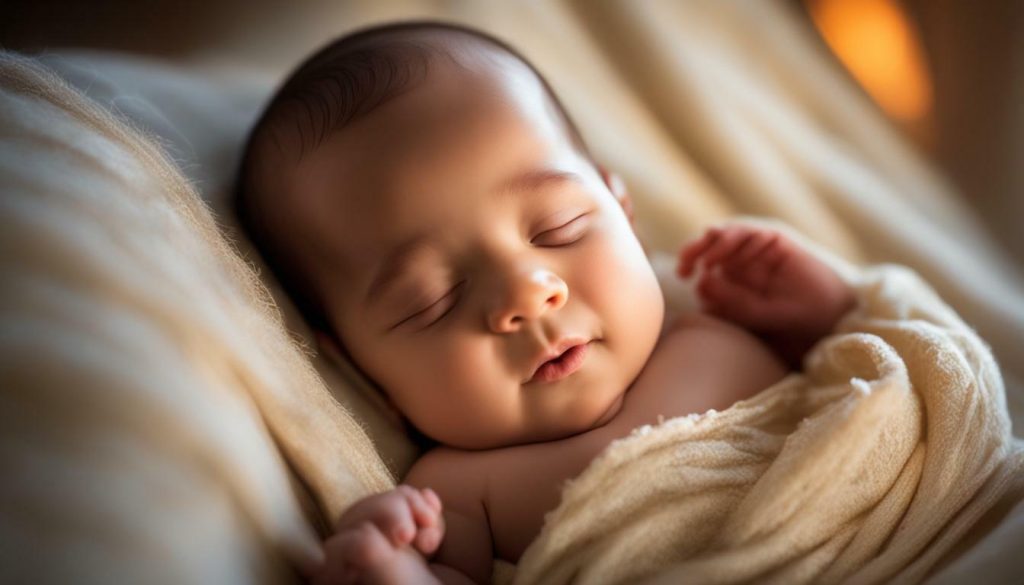
It’s important for parents to understand that emotional experiences, both awake and asleep, contribute to their baby’s growth. By providing a nurturing and loving environment, we can help foster positive emotional experiences and encourage even more smiles during sleep.
| Emotional Experiences and Smiling in Sleep | |
|---|---|
| Emotional experiences bring about smiles | Creating heartwarming moments |
| Smiles reflect joy and contentment | Positive emotional development |
| Smiles indicate cognitive and emotional growth | Building connections in the brain |
Quotes:
“A baby’s smile in sleep is a priceless reminder that they are experiencing positive emotions and forming strong connections in their brain.” – Dr. Jane Johnson
Summary:
Emotional experiences can elicit smiles in a baby’s sleep, reflecting their joy and contentment. These smiles are a testament to their cognitive and emotional development, as they process positive emotions and form important connections in their brain. By creating a nurturing environment, parents can encourage even more smiles during sleep, fostering their baby’s overall well-being and positive experiences.
The REM Sleep Phase and Smiling
Smiling in sleep is often observed during the REM sleep phase, let’s find out why. The REM sleep phase is a crucial stage of sleep characterized by rapid eye movement, increased brain activity, and intense dreaming. It is during this stage that babies may experience vivid dreams, and their brain processes information and forms connections necessary for their development.
During REM sleep, babies may exhibit various reflexes, including smiling. These reflexes are believed to be a result of the brain’s activity and physiological changes that occur during this stage. It is still a mystery why exactly babies smile in their sleep, but it is likely linked to the brain’s processing of emotions and experiences.
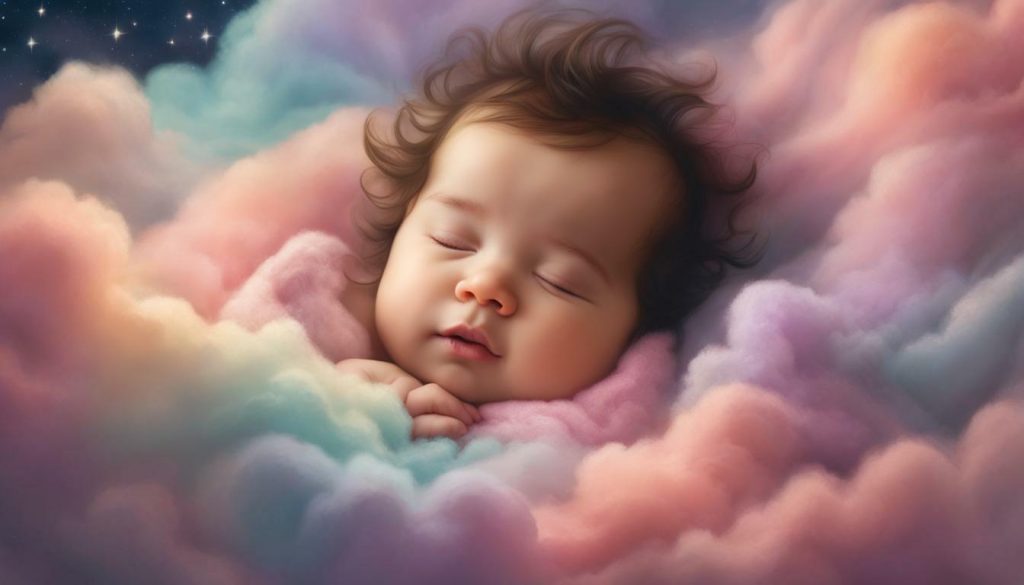
| Possible Reasons for Smiling in Sleep |
|---|
| Reflexes triggered by brain activity |
| Processing of emotional experiences and dreams |
| Development of cognitive functions |
While it is important to note that not all smiles during sleep are indicative of dreams or mental activity, they can still be a fascinating glimpse into a baby’s developing mind. By observing a baby’s smiles in sleep, parents and caregivers can gain insights into their emotional well-being and overall development.
Similarities to Awake Smiling
The reasons behind a baby’s smile in sleep are quite similar to why they smile when awake. Smiling during sleep is often an involuntary reflex, and babies may also smile in response to passing gas or stool. It’s their way of expressing comfort and contentment. Just like when they are awake, babies may also smile in response to pleasant sensory experiences, such as the taste or smell of milk, or the touch of a soft blanket.
During both wakefulness and sleep, babies are constantly processing information and learning about the world around them. They may smile in response to familiar faces, voices, or objects that bring them joy. Smiling is their way of connecting with their caregivers and showing their happiness.
While the exact reason for a baby’s smile in sleep is unknown, it is believed to be linked to the rapid eye movement (REM) sleep phase. This stage of sleep is associated with vivid dreams and increased brain activity. It’s during REM sleep that babies may experience physiological changes and reflexes, including smiling. It’s their brain’s way of responding to the dream-like images and feelings they are experiencing.
| Similarities to Awake Smiling | Reasons for Smiling in Sleep |
|---|---|
| Smiling in response to sensory stimuli | Reflexes triggered by passing gas or stool |
| Smiling in recognition of familiar faces or voices | Brain processing information and dreams during REM sleep |
| Connecting with caregivers and expressing happiness | Emotional experiences during sleep |
It’s important to note that excessive or prolonged smiling during sleep or other unusual symptoms may warrant medical attention. Monitoring your baby’s sleep patterns and seeking medical advice when necessary can help ensure their overall well-being. In the meantime, parents can encourage their baby to smile by engaging in face-to-face interaction, gentle touch, and play. These interactions stimulate their senses and create positive experiences, reinforcing their development and happiness.
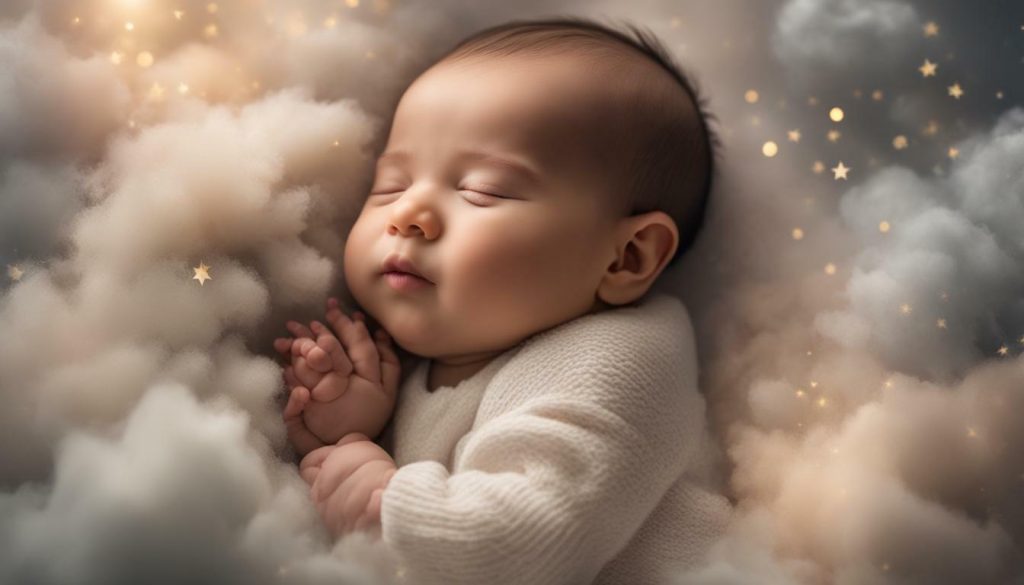
When to Seek Medical Attention
While a baby’s smile in sleep is normal, certain behaviors may warrant medical attention. It’s important for parents to be aware of any unusual symptoms or excessive smiling that could indicate an underlying issue. If you notice any of the following behaviors, it may be beneficial to consult a healthcare professional:
- Prolonged periods of smiling during sleep
- Frequent interruptions in sleep patterns accompanied by smiling
- Inconsolable crying or distress during sleep
- Excessive sweating or rapid breathing during sleep
- Changes in appetite or weight gain/loss
These symptoms could potentially be signs of an underlying health condition or sleep disorder that may require medical intervention. It’s always better to err on the side of caution and seek professional advice if you have any concerns about your baby’s sleep behaviors.
| Reasons to Seek Medical Attention | When to Consult a Healthcare Professional |
|---|---|
| Prolonged or excessive smiling during sleep | If the behavior persists for an extended period of time or is accompanied by other unusual symptoms |
| Frequent interruptions in sleep patterns with smiling | If the interruptions are impacting your baby’s overall well-being and development |
| Inconsolable crying or distress during sleep | If your baby consistently exhibits signs of discomfort or distress during sleep |
| Excessive sweating or rapid breathing during sleep | If these symptoms are recurrent and cause concern |
| Changes in appetite or weight gain/loss | If your baby’s eating habits or weight show significant changes |
Remember, every baby is different, and what may be normal for one may not be for another. Trust your instincts as a parent and reach out to a healthcare professional if you have any concerns about your baby’s sleep behaviors.
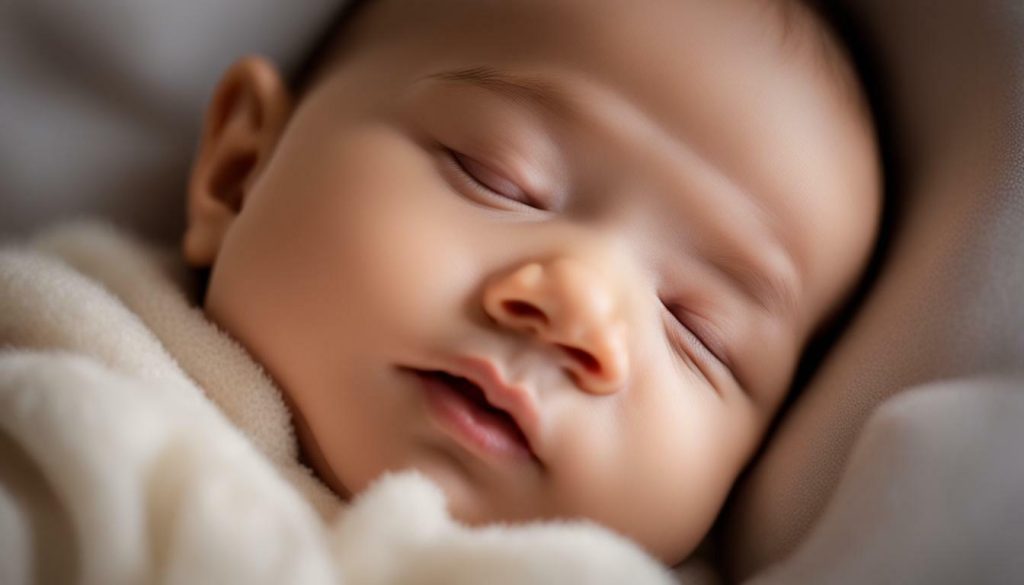
Understanding why babies smile in their sleep sheds light on their fascinating development and brings joy to parents’ hearts. Babies smile in their sleep for various reasons, including reflexes, cognitive development, and emotional experiences. Smiling during sleep is often an involuntary reflex, and babies may also smile in response to passing gas or stool.
Smiling in sleep typically occurs during the rapid eye movement (REM) sleep phase, where babies may experience vivid dreams and physiological changes that trigger reflexes. While the exact reason for a baby’s smile in sleep is unknown, it is assumed to be similar to why they smile when awake, such as reflexes, reactions to people or things, or sensory responses to taste or smell.
It’s important to note that excessive or prolonged smiling during sleep or other unusual symptoms may warrant medical attention. Parents should monitor their baby’s sleep patterns and consult a healthcare professional if they have any concerns. Additionally, parents can encourage their baby to smile by engaging in face-to-face interaction, gentle touch, and play.
Overall, a baby’s smile in sleep is a normal and healthy part of their development. It’s a beautiful reminder of the wonder and joy that comes with watching our little ones grow.
FAQ
Why do babies smile in their sleep?
Babies smile in their sleep for various reasons, including reflexes, cognitive development, and emotional experiences. It is a normal and healthy part of their development.
Is smiling during sleep an involuntary reflex?
Yes, smiling during sleep is often an involuntary reflex. Babies may also smile in response to passing gas or stool.
When do babies typically smile in their sleep?
Smiling in sleep typically occurs during the rapid eye movement (REM) sleep phase, where babies may experience vivid dreams and physiological changes that trigger reflexes.
What is the reason for a baby’s smile in sleep?
The exact reason for a baby’s smile in sleep is unknown, but it is assumed to be similar to why they smile when awake, such as reflexes, reactions to people or things, or sensory responses to taste or smell.
Should I be concerned if my baby excessively or prolonged smiles during sleep?
Excessive or prolonged smiling during sleep, along with other unusual symptoms, may warrant medical attention. It’s important to monitor your baby’s sleep patterns and consult a healthcare professional if needed.
How can I encourage my baby to smile during sleep?
While you can’t control when or why your baby smiles in sleep, you can encourage overall positive interactions by engaging in face-to-face interaction, gentle touch, and play during wakeful periods.


